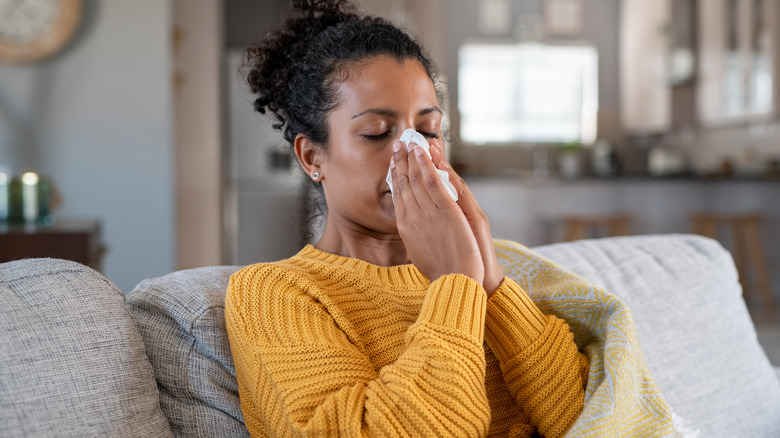Study Finds Increased Health Risks Come With Repeated COVID Infections
Following a COVID-19 infection, the body typically retains a level of immunity for some time after the fact, reports the National Institutes of Health. With the help of antibodies, T cells, and B cells, the body can effectively identify and eliminate the virus in the event of reinfection, thereby reducing the severity of symptoms. However, a new study published in Nature Medicine has suggested that cases of COVID reinfection can put a person at risk for various health conditions in the months following the illness.
The study team pulled electronic health records spanning the course of two years between March 2020 and April 2022 from the U.S. Department of Veterans Affairs' database, reports HealthDay. Per the study, the medical records pertained to 443,588 patients with one prior test-confirmed case of COVID, 40,947 patients having had incurred at least two COVID-19 infections, and 5,334,729 patients who had not contracted the virus during the designated two years.
Some of the reinfected patients had experienced as many as four or more cases of infection. The study findings showed that with each subsequent infection, patient risk of death, hospitalization, and health conditions increased during a six-month follow-up period.
COVID reinfections may increase one's risk for these conditions
"During the past few months, there's been an air of invincibility among people who have had COVID-19 or their vaccinations and boosters, and especially among people who have had an infection and also received vaccines," senior study author Dr. Ziyad Al-Aly states (via SciTechDaily).
Yet the research findings showed that these health risks after reinfection remained whether patients were unvaccinated, vaccinated, or boosted. More specifically, compared to patients who had only experienced one infection, reinfected patients were at a three times' higher risk for heart conditions, were 1.6 times more susceptible to neurological conditions, and 3.5 times more prone to subsequent lung issues over the following six months (per SciTechDaily). In comparison to those who had no history of reinfection during the study period, the risk for hospitalization was tripled amongst reinfected patients and the risk of all-cause mortality was twice as high.
Experts not involved with the study told Reuters that the study is not necessarily a representative sample, as it draws from a population that tends to have more health conditions than the general population. Dr. Celine Gounder, an infectious disease epidemiologist, states that the jump in risk of complications due to multiple COVID infections may lessen over time.
"The good news there is that the better people are protected with immunity, likely the risk of developing some of the complications will be lower over time," she states via Reuters.
Regardless, it's never a bad idea to take precautions against COVID-19 infection.


